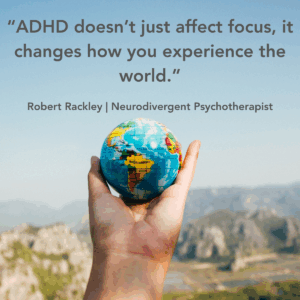ADHD and Sensory Overwhelm — Why It’s Not “Too Loud,” It’s Too Much
By Robert Rackley | The Neurodivergent Psychotherapist
For many people with ADHD, the world doesn’t just feel busy — it feels overwhelming.
Noise, light, smells, movement — instead of filtering them out, the ADHD brain often takes them all in at once.
This is what we call sensory overwhelm.
It isn’t about being too sensitive or overreacting. It’s about a nervous system struggling to process and regulate input that others may barely notice.
What Sensory Overwhelm Looks Like
In daily life, this might show up as:
Sounds that others tune out but feel piercing or unbearable
Lighting that’s fine for most but feels blinding or harsh
Crowds that leave you drained instead of energised
When the brain is flooded with too much input, the body reacts — irritability, withdrawal, shutdown, or emotional outbursts.
From the outside, it can look like moodiness or avoidance.
But from the inside, it feels like survival.
ADHD, Sensory Processing, and Mental Health
ADHD is more than difficulties with focus — it’s a different way of experiencing the environment.
When sensory overwhelm is misunderstood, shame often follows:
“Why can’t I cope like everyone else?”
“Why do I always get irritable in busy places?”
“Maybe I’m just difficult.”
But the reality is clear: this isn’t weakness or drama.
It’s the nervous system at capacity.
For many of my ADHD clients, sensory overwhelm is the invisible trigger behind emotional exhaustion, anxiety, and burnout.
Recognising this is often the first step toward self-compassion.
What Helps with Sensory Overwhelm
Small environmental changes can make a big difference:
Wearing noise-cancelling headphones in loud spaces
Using adjustable or soft lighting
Scheduling quiet breaks after overstimulating activities
Building in sensory-friendly routines that bring calm
These aren’t “special treatments.”
They’re regulation strategies — ways to support the ADHD brain so it can function more effectively.
Final Thought
Sensory overwhelm doesn’t mean someone is overreacting.
It means their nervous system is processing too much, too quickly.
When we adapt environments instead of blaming individuals, we reduce shame and make everyday life more liveable for people with ADHD.
Because understanding sensory needs isn’t indulgence — it’s inclusion.

